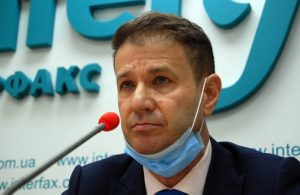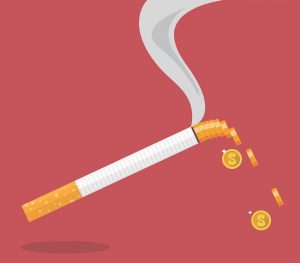
Revenues from excise tax on manufactured and imported goods in January-May 2025 reached UAH 69.7 billion, compared to UAH 46.9 billion in the same period last year, according to Ruslan Kravchenko, head of the State Tax Service (STS).
“In five months, the budget has already received UAH 11.3 billion (+19.3%) more than planned. In May 2025, UAH 15.3 billion in excise tax was received,” he said.
Kravchenko explained that the overperformance was due to an increase in imports of excisable goods, in particular tobacco products.
“Systematic control over the circulation of excisable goods is also yielding noticeable results,” added the head of the State Tax Service.

The Verkhovna Rada intends to reduce the rate of excise tax on beer to UAH 1.39 per liter from UAH 2.78 per liter for producers whose annual production volume does not exceed 200,000 hectoliters, as well as introduce the term “small beer producers.”
At a plenary session of parliament last week 284 MPs with the required minimum of 226 votes backed bill backed at first reading No. 5118 on amendments to Article 215 of the Tax Code of Ukraine.
According to an explanatory note to the document, there are 204 breweries in Ukraine with an annual production volume of up to 3,000 hectoliters, which pay UAH 30,000 per year for a wholesale beer trade license, and 28 breweries with a production volume of up to 200,000 hectoliters (for their annual license is UAH 500,000).
These companies account for 13% of the beer market in Ukraine, while the remaining 87% is divided among nine large beer producers. According to the document, the total tax burden per 1 liter of beer produced by small producers is significantly higher than the same indicator at the enterprises of the beer giants.
In addition, the authors of the bill said that all small beer producers are under significant regulatory and financial pressure, since they pay other tax payments along with the excise tax. In this regard, the reduction in the excise tax rate is proposed.
The bill will determine the entities of applying the reduced rate by introducing the term “independent small brewery” – an enterprise legally and economically independent from any other brewery, geographically located separately from other breweries.
According to the explanatory note, the bill brings the tax legislation of Ukraine closer to the EU legislation, complies with the EU Council Directive 92/83/EEC on the harmonization of the structures of excise duties on alcohol and alcoholic beverages dated October 19, 1992.
As expected, the implementation of bill No. 5118 will result in a decrease in annual budget revenues by UAH 328.3 million due to a decrease in excise tax rates on beer. At the same time, in the long term, due to the expected growth in beer production by about 20 million liters, the budget will be significantly replenished with tax receipts in the form of excise tax, single social security contribution, personal income tax, etc.

Philip Morris Ukraine this year predicts a decline in the legal market of heated tobacco products by 3.1 times compared to last year, to 1.5 billion pieces, due to an increase in the excise tax on these products from January 2021 by 320%, Financial Director of Philip Morris Ukraine Maksym Barabash said at a press conference in Interfax-Ukraine.
“A one-time increase in excise taxes by 320% from January 1 requires a price increase of approximately UAH 29 (for a pack of heated tobacco products), not including the price increase due to inflation and the devaluation of the hryvnia. If we transfer this price increase to consumers, the price will increase to 80-90,” he explained.
CEO of the company Kostas Salvaras said that Philip Morris Ukraine supports amendments to law No. 4278, proposing an increase in the excise tax on heated tobacco products by 200% with its further growth by 30% in 2022-2025 instead of a one-time increase by 320%. These changes in the form of amendment No. 55 were adopted in February by the parliamentary committee on finance, taxation and customs policy.
According to the calculations of Philip Morris Ukraine, a smoother increase in the excise tax will help protect the legal market, the capacity of which, if this amendment is adopted, will grow this year by 6.3% compared to 2020, to 5 billion units.
The company also expects that in the event of a gradual increase in tax, the growth of revenues to the state budget in 2021 will not be lower than UAH 4.8 billion planned by the Ministry of Finance, and UAH 6.5-7.5 billion in 2022.
Barabash clarified that a one-time increase in excise tax by 320% will lead to a 1.5-fold increase in prices for the products, and will make illegal import of heated tobacco products four times more profitable than smuggling regular cigarettes. The company’s financial director estimated the profit from the illegal import of one heated tobacco product box at $ 500-800.
In addition, according to him, the equalization of the excise tax rate for heated tobacco products and ordinary cigarettes to 320% will entail a return of users of devices for heating tobacco to cheaper and more harmful nicotine-containing products – cigarettes. He noted that this decision contradicts European practice, since on average in the EU countries the excise tax on heated tobacco products is 72% lower than the excise tax on cigarettes, while in Ukraine this figure is 28%.
Barabash clarified that a sharp increase in the excise tax on this product would jeopardize UAH 4.2 billion already invested in the development of the Ukrainian infrastructure of the IQOS brand, which employs more than 2,000 people. It will also make it impossible to localize the production of heated tobacco products in Ukraine, which could reduce the price of this product.
As reported, Philip Morris International is one of the world’s largest tobacco manufacturers. It produces cigarettes in more than 50 factories and sells them in 180 countries.
The company has been operating in Ukraine for over 20 years. In Ukraine, Philip Morris owns a factory in Kharkiv region, the company employs over 1,300 people.
In 2020, the company reduced the shipment of cigarettes in Ukraine by 4.3% compared to 2019 due to a general market decline, which was partially offset by an increase in the market share of heated tobacco products.

An increase in the excise tax on heated tobacco products by 200% from April 1 this year and its further growth by 30% (up to 320% in total) in 2022-2025 – such a compromise solution will allow avoiding too sharp price jumps and will provide more tax revenues than the alternative “shock” scenario, according to the Ukrainian League of Industrialists and Entrepreneurs (ULIE).
As reported on the union’s website on Monday, the business supports relevant bill No. 4278, which provides for such a procedure for increasing the excise tax. At the same time, the organization believes that this approach, among other things, will save jobs in companies, and the legal market, without reducing tax revenues to the budgets of various levels.
According to the business league, the Verkhovna Rada Committee on Finance, Tax and Customs Policy, when considering bill No. 4278, supported an increase in the excise tax on heated tobacco products by 200% in 2021 and a subsequent annual increase by 30% in 2022-2025.
The ULIE referred in a press release to the data of the Institute for Economics and Forecasting of the National Academy of Sciences of Ukraine, according to which a gradual increase in excise tax rates on heated tobacco products within five years will provide UAH 18.7 billion more tax revenues than the alternative “shock” scenario with an increase in excise tax immediately in 4.2 times this year.
At the same time, the ULIE clarified that under the model of a gradual increase in excise tax, Philip Morris Ukraine tobacco company guaranteed the payment of more than UAH 11 billion of excise tax on heated tobacco products to the state budget of Ukraine during 2021-2022.
The Ukrainian League of Industrialists and Entrepreneurs said that legislative amendments affecting the consumer basket should correlate with the purchasing power of consumers, which will ultimately be affected by the rise in prices for products. “Otherwise, this situation will stimulate smuggling and the illegal sector,” the business league said.
As reported, on January 16, 2020, the Verkhovna Rada adopted law No. 1210, which introduced amendments to the Tax Code of Ukraine, increasing the excise tax rate on heated tobacco products by 4 times from January 1, 2021. Also, a separate product subgroup is introduced for heated tobacco products.